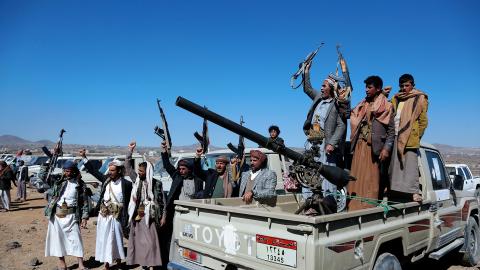
US Strikes 14 Terror Sites in Yemen, Telling Iran to 'Stop Arming Houthis'
The United States sent a strong message to Iran on Wednesday: Stop arming the Houthi rebels targeting ships in the Red Sea.
That message was sent as the U.S. military once again struck Houthi-controlled areas of Yemen. A missile barrage fired from ships and submarines hit 14 launch sites deemed an "imminent threat." It marked the fourth time in days the U.S. has directly targeted the terrorist group.
The strikes followed an official announcement that the U.S. has put the Houthis back on its list of specially designated global terrorists. The sanctions that come with the formal designation are meant to sever violent extremist groups from their sources of financing.
"Forces conducted strikes on 14 Iran-backed Houthi missiles that were loaded to be fired in Houthi-controlled areas in Yemen," Central Command said in a statement posted on X late Wednesday. "These missiles on launch rails presented an imminent threat to merchant vessels and U.S. Navy ships in the region and could have been fired at any time, prompting U.S. forces to exercise their inherent right and obligation to defend themselves."
Despite the possible sanctions and military strikes, including a large-scale operation on Jan. 12 carried out by U.S. and British warships and warplanes that hit more than 60 targets across Yemen, the Houthis are continuing their harassment campaign of commercial and military ships. The latest incident occurred Wednesday when a one-way attack drone was launched from a Houthi-controlled area in Yemen and struck the Marshall Islands-flagged, U.S.-owned and operated M/V Genco Picardy in the Gulf of Aden.
As CBN News reported, a U.S. raid by a Navy SEAL team on a small boat intercepted ballistic missile parts, including warheads that Iran was shipping to Yemen. Two U.S. Navy SEALs remain unaccounted for after one was knocked off the vessel by a wave during the seizure and the second followed the overcome SEAL into the water.
***Please sign up for CBN Newsletters to ensure you keep receiving the latest news from a distinctly Christian perspective.***
 Tensions Flare as Iran and Pakistan Target Insurgent Groups Inside Each Other's Borders
Tensions Flare as Iran and Pakistan Target Insurgent Groups Inside Each Other's Borders
Meanwhile, airstrikes this week between Iran and Pakistan killed at least 11 people, marking a significant escalation in the years-long volatile relationship between the two neighbors.
The countries accuse each other of providing safe haven to insurgent groups in their respective territories.
Military strikes by Iran have raised concerns that conflict could escalate in the region. In recent days, Iran's Revolutionary Guard fired missiles at targets allegedly linked to the Islamic State in Syria, and what it called "Israeli spy headquarters" in Iraq.
Now, tensions are rising with its neighbor Pakistan after Iran carried out deadly strikes against militant groups on Pakistani soil. Jaish al-Adl, the Sunni separatist group that Iran targeted on Tuesday, is believed to operate out of Pakistan, launching attacks on Iranian security forces.
Pakistan's air force launched retaliatory air strikes Thursday, targeting the hideouts of the Baluchistan Liberation Army (BLA) and the Baluchistan Liberation Front inside Iran. The BLA, which was formed in 2000 and has launched attacks against Pakistani security forces and Chinese infrastructure projects, is suspected of hiding out in Iran.
The risk of escalation remained high Thursday as Iran's military began a planned annual air defense drill, spanning the entire country. The drill will include maneuvers stretching from the Islamic Republic's port of Chabahar near Pakistan in the east to its western border with Iraq in the west. The drill, named "Velayat 1402," will include live fire from aircraft, drones, and air defense systems.
There are also complex geopolitical considerations in the tension between the two Islamic republics. Pakistan's military relies on U.S., Chinese, and French fighter jets for its air force — meaning some of those foreign weapons were used in Thursday's attack



